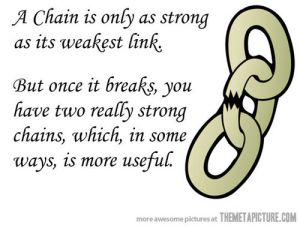 Managing based on the idea of the lowest common denominator (LCD) is based on a negative view of people and overall human nature and is intended to provide protections from the weakest link in the proverbial chain.
Managing based on the idea of the lowest common denominator (LCD) is based on a negative view of people and overall human nature and is intended to provide protections from the weakest link in the proverbial chain.
The Rule of Expectations
It’s been said that people will live up to your expectations. If you set your expectations low, people will live up to them and if you set them high people will live up to them – so set them high. This is known as the Rule of Expectations. The Rule of Expectations uses expectations to influence an outcome and get results. Like it or not, people (and employees) tend to make decisions based on how others expect them to behave or perform and fulfill expectations – be them positive or negative.
Expectations have a powerful impact on those who respect and trust us, but they also can have a huge impact on those we barely know or even perfect strangers – because human nature attempts to gain respect, seeks approval and desires to be liked.
In business, you’ve likely heard the adage, “What gets measured, gets done”, well the same is true for expectations. What is expected is what actually happens. Your expectations can become self-fulfilling prophecies and can actually lead to people improvements or people destruction. If you express your expectations in terms of doubts, skepticism and lack of confidence, you will likely get those results. On the other hand, if you show confidence in people and expect them to succeed, you will likely see that results. 
John Maxwell and Jim Dornan in their book, Becoming a Person of Influence, put it this way, “Those who believe in our ability do more than stimulate us. They create for us an atmosphere in which it becomes easier to succeed”.
The Rule of Expectation in Action
Several years ago, my son, Matthew, was struggling to find his direction and purpose in life. He had been through a bad break up with a girl he dated for several years, another close friend was brutally murdered by her step-brother and his dad and I had relocated to Nashville, TN and left him alone in Ohio at Bowling Green State University. Needless to say he felt his world was spinning out of control and his outlook and grades showed it.
It wasn’t long after all this that he decided he needed a new direction so he moved back to South Carolina to live with his grandparents and attend school. But this proved not to be the answer either. He continued to struggle in his new environment not sure what he wanted to do, where he wanted to go to school or what his life path should be. He continued to flounder for a couple of years. Starting school, taking a break, and even moving to Texas with his older adopted brother to work in the moving and storage industry. Nothing worked! He wasn’t motivated by any of it, and worse yet, he had developed a mental image where he expected to fail – and he was living up to that expectation.
Finally after almost a year in Texas, he decided the manual labor of the moving industry wasn’t his desired career choice, so he moved back to South Carolina and started school yet again. After struggling for a couple more quarters, his grandmother, a highly respected Realtor in South Carolina, talked him into going into real estate and taking the licensing exam. Well, Matt jumped on that idea, because he thought it was quick and a sure fire solution to his lack of focus. So, he signed up for the week long crash course and was off to the races. He worked diligently throughout the course and then took the national real estate exam. He passed with flying colors, but he still had to pass the state exam to become licensed in SC.
Well, the state exam wasn’t as easy and he failed it – only by a couple of questions. He was close but not close enough. Not discouraged, he signed up to take it again. He dove back into the books and studied like crazy. Again, it was close but he failed a second time – this time by one question!
At this point he did what any 22 year old would do, he called Mom. When he got me on the phone I could tell he was feeling totally defeated, down trodden, and discouraged. He was sure he was a complete failure and would never make anything out of his life – in other words, all his expectations were being met!
At this point his dad and I had been through the yelling, bribing, admonishment, disappointment etc., and none of it had motivated him to excel. So, led by the grace of God, when he asked me what he would do if he failed it again, I told him he would keep trying. Then I said the magic words; “I know you can do it!” I told him it was just a test and it was no reflection of him as a person if he didn’t pass it. He would just have to get up and try again. But then I reiterated, “I know you can do it!”. I told him if he would just settle down, take a deep breath and concentrate on the desired outcome he could do it! Those were the magic words, I could literally hear the relief in his voice. My expectation was clear – I knew he could do it – whether it took 1 additional attempt or 10. So now he was trying to live up to my high expectations instead of his low expectations.
The next day he went to the testing center with an expectation that he could, in fact, pass this exam – and he did, with flying colors! That simple expectation changed not only that outcome, it carried over into every other aspect of his life! Now that he had become a licensed real estate agent his confidence knew no bounds. He began setting other goals and expectations and his grades and work quality soared!
That was 3 years ago and today, he’s a graduate of Tri-County Technical College with an Associate’s Degree in Business, he’s a successful Real Estate Agent with Prudential Real Estate and has applied to Clemson University for fall admission. The Rule of Expectation in action!
Managing to the Lowest Common Denominator (LCD)
In business it’s often easier to manage to the lowest common denominator (LCD) because there is a perception that if we account for every possible fallacy, we won’t have to actually think. Leading in an LCD environment is often expressed in such terms as: employees are dumb, they can’t be trusted to do things right (or do the right thing), they always screw up, they will steal you blind, they’re lazy and so on.
While it’s true, in all organizations, errors will happen, misunderstandings will occur, some things that should happen won’t, and some things that shouldn’t happen will, but that shouldn’t discourage you as a leader from striving for excellence and setting high expectations.
In an LCD culture, because a few people will make mistakes or not understand simple instructions, everyone is treated as if they can’t be trusted. Managers come to believe that the errors, mistakes, and indifference of a few are the rule, not the exception. And based on the Rule of Expectation – they are probably right!
In response to this attitude, leaders develop rules, policies, decisions, and procedures in anticipation of the actions of the LCD. Managers attempt to control every aspect of the work environment. They work very hard to anticipate every possible situation and contingency and prescribe, in advance, standardized solutions because, after all, employees can’t be trusted to solve problems or use their own judgment to handle situations. In other words, check your brain at the door because no thinking allowed!
This response inevitably leads to repetitive, overly prescriptive micro-management tactics that further erode trust, performance and results and any chance of high engagement, personal responsibility and non-punitive accountability. Ironically, despite all their efforts, mistakes and exceptions are never eliminated. In fact, in an LCD culture, mistakes and exceptions are exacerbated because people figuratively check out – after all that’s what’s expected.
It’s worse than the Pareto Principle
The Pareto Principle states that 80% of the effects come from 20% of the causes. If this is true, 80% of the problems in any organization are caused by 20% of the employees. In a LCD environment, managers don’t focus on how to effectively and efficiently serve the 98% of employee who do things right, instead they dedicate the majority of their time, resources and energy to anticipating and resolving the problems caused by only 2% of the employees. The fact that exceptions are never eliminated further reinforces the need for managers to accommodate the LCD. And the vicious cycle persists – management’s inability to prevent exceptions drives more focus on increasing resources to resolve the potential, future problems of a tiny minority at the expense of trusting the vast majority.
Not only is management by LCD highly inefficient in delivering services and costly in fiscal terms, it also takes a human toll – demoralizing employees with low expectations which lowers performance across the board. It prevents leaders from capitalizing on the strengths, knowledge and initiative of team members which further contributes to the ineffectiveness of the organization and the vicious reinforcement of the LCD cycle.
The Courage to Lead
As a leader, take a step back and question your assumptions. Ask yourself(ves) “Do we concentrate a lot of our efforts on what people might do wrong or do we count on people to do what’s right?”; “Do we write our policies and procedures for the 2% that will abuse the policy or the 98% who won’t?”; “Do we try to compensate for possible failures or do we expect success?”; “Do we think employees are dumb or do we think they are the key to our success? Do we establish and communicate the right expectations?” “Do we plan for failure or do we plan for success?” If your responses to these questions indicate LCD thinking, it’s time to try something different.
I know it seems impossible, but there are tremendous advantages (operational efficiencies, fiscal savings and human successes) to dumping your “LCD” management style. It won’t be easy, but the payoff are tremendous – after all – no pain, no gain – right?
So, ask yourself and those you influence in your organization, “Do we have the courage to lead a team based on high expectation instead of the LCD?” If your answer is yes, review your policies, procedures, rules and decisions and decide what needs to change to shift your focus from low expectations to high expectations – and then watch the Rule of Expectations take over.
But remember, you didn’t get here overnight and you won’t change overnight. It takes, time, diligence, patience, reinforcement and intentional leadership. It won’t be easy and you and your team will make mistakes, but if you expect everyone to learn from those mistakes and rise to the occasion, they will and your results will soar.
We’d love to hear your story of the Rule of Expectations. Don’t be shy, share it today and it could be featured in our upcoming book!


